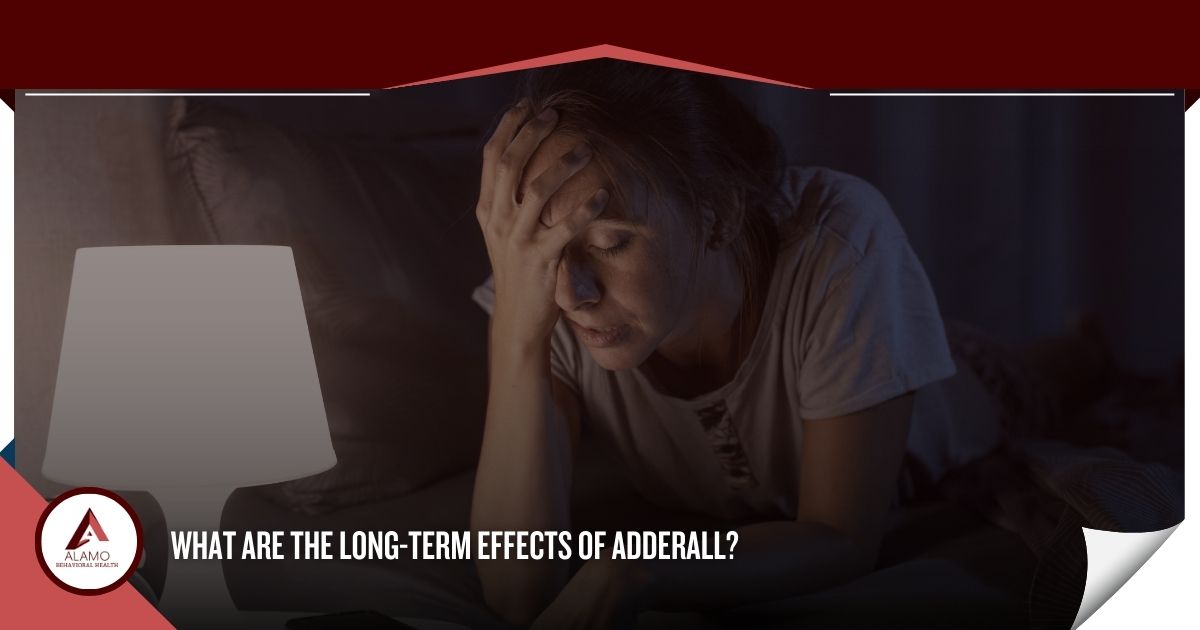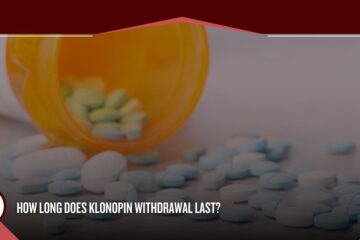An estimated 8.7 million adults in the United States live with attention deficit hyperactivity disorder (ADHD).[1] Many take prescription stimulant medications to manage the symptoms of this condition.
Adderall is one of the most commonly prescribed stimulant drugs used to treat ADHD. Adderall is a highly addictive prescription drug. People who abuse Adderall may quickly develop an addiction to it.
This article will explore the long-term effects of Adderall abuse.
What you will learn:
- The side effects of Adderall
- The long-term effects of Adderall abuse
- How to recognize prescription stimulant abuse
- What to expect in prescription drug abuse treatment
- Where to find treatment and support for substance abuse
If you or someone in your life struggles with Adderall abuse or addiction, help is available at Alamo Behavioral Health. Contact our specialists to explore our treatment programs or to schedule an intake assessment.
What is Adderall?
Adderall is a prescription stimulant drug. Its active ingredients are amphetamine and dextroamphetamine. It is a highly addictive controlled substance.
Doctors may prescribe Adderall to help people manage the symptoms of attention deficit hyperactivity disorder (ADHD). People may also take it to treat a sleep disorder called narcolepsy.[1]
When people take Adderall, they may experience:
- Better focus
- Increased ability to maintain attention
- Improved organization
People with ADHD are unlikely to develop an addiction to Adderall when taking it as prescribed. However, Adderall can be addictive among those taking it recreationally (without a prescription). Teens, college students, and young adults are among the most likely groups to abuse Adderall and other prescription stimulants.[3]
It is crucial to take Adderall exactly as your doctor tells you to. If you do not have a prescription for Adderall, you should not take it. Seek treatment if you have trouble quitting Adderall.
The Side Effects of Adderall
When taking Adderall to treat attention deficit hyperactivity disorder (ADHD), people experience a reduction in disruptive symptoms. People may be able to focus on tasks for longer periods, stay organized, and complete projects.
However, people who take it may have unwanted side effects. This is more common in those who abuse Adderall.
People who take Adderall may experience a range of short-term side effects, including:[2]
- Anxiety
- Dizziness
- Dry mouth
- Headache
- Insomnia
- Mood changes
- Nervousness
- Rapid or irregular heartbeat
- Reduced appetite
- Weight loss
Some people experience more severe side effects when taking Adderall, including:
- Fainting
- Numbness in the arms and legs
- Shortness of breath
- Chest pain
- Pounding heart
- Difficulty breathing or swallowing
You must seek immediate medical care if you or someone near you is exhibiting complications of Adderall use.
People who misuse Adderall may develop a physical dependence on it. Adderall addiction is a complex condition requiring comprehensive treatment and ongoing support.
The Long-Term Effects of Adderall Abuse
Long-term use of Adderall can lead to serious health problems. Misusing Adderall may increase your risk of developing long-term complications.
Some of the long-term effects of Adderall use include:[4,5]
- High blood pressure
- Heart problems, including heart disease, increased risk of heart attack and sudden death, and irregular heartbeat
- Increased risk of seizures
- Skin problems
- Addiction
Research shows that long-term use of ADHD medications, including Adderall, is generally safe. However, abusing Adderall can increase the risk of severe, even life-threatening, health problems.
It is important to recognize the risk of Adderall addiction. Watch for signs of misuse or addiction. Seek treatment as soon as you identify a problem.
Recognizing and Treating Adderall Addiction
Adderall affects dopamine and norepinephrine levels in the brain. Drugs affecting these brain chemicals may have a greater risk of misuse and dependence.
It is important to recognize signs of Adderall misuse and seek treatment right away. Some symptoms of Adderall abuse or addiction include:
- A sudden increase in social behaviors
- Excessive talkativeness
- Increased energy levels or motivation
- Hyperactivity
- Excitability
- Changes in behaviors or mood, such as worrying, becoming irritable, impatient, or anxious more often
- Over-thinking small decisions
- Insomnia or other sleep problems
- Frequent headaches, tremors, or nausea
Adderall abuse can significantly affect how people think, feel, and behave. If you notice these behaviors in yourself or others, it may be a sign that treatment is necessary.
During an Adderall abuse treatment program, you will receive evidence-based and holistic therapies to help you understand and heal the roots of your substance abuse. Your treatment plan may include:
- Assessment and screenings
- Medically-supported detox treatments, including medications to reduce withdrawal symptoms
- Behavioral therapies, including cognitive behavioral therapy (CBT)
- Individual, group, and family therapy
- Relapse prevention education
- Coping skills practice
- Aftercare planning and support
Many people begin their recovery journey in an inpatient rehab center before transitioning into outpatient treatment programs. Your recovery process will depend on your unique needs and recovery goals.
Find Treatment Now
If you or someone you love struggles with Adderall abuse, you are not alone. Contact the Alamo Behavioral Health specialists to learn how our comprehensive rehab programs can help you regain control over your health and future. Take the first step of your recovery journey by scheduling an intake assessment.
References:
- Forbes: ADHD Statistics And Facts In 2024
- U.S. Food and Drug Administration (FDA): Adderall
- Johns Hopkins Bloomberg School of Public Health: Adderall Misuse Rising Among Young Adults
- National Institute of Health (NIH): Potential Adverse Effects of Amphetamine Treatment on Brain and Behavior: A Review
- National Institute of Health (NIH): Neurocognitive, Autonomic, and Mood Effects of Adderall: A Pilot Study of Healthy College Students







